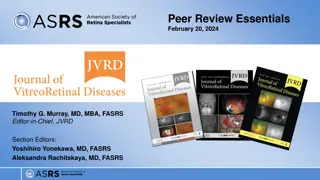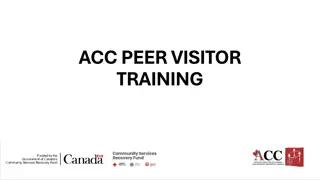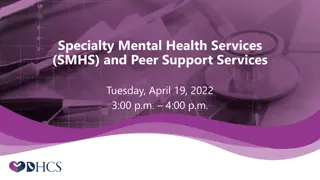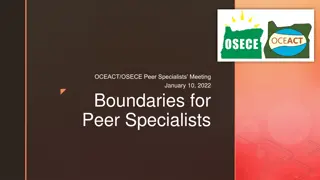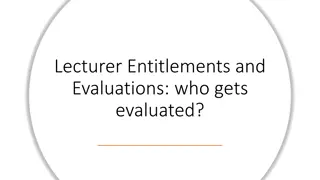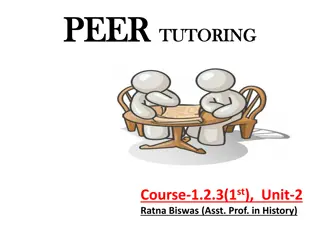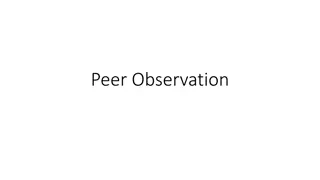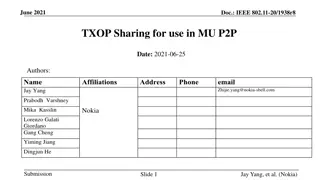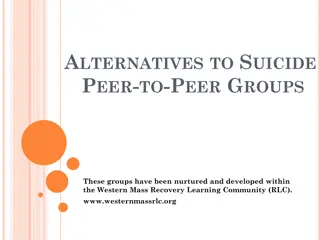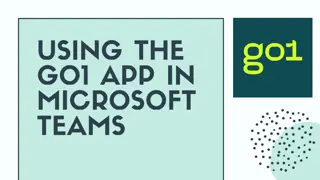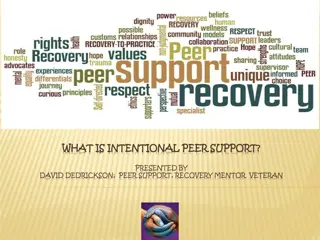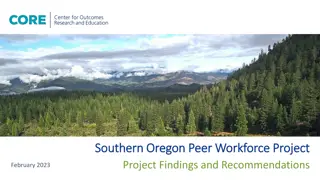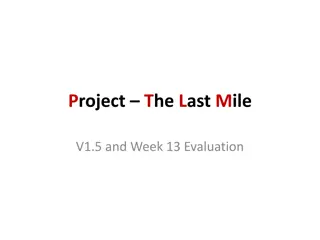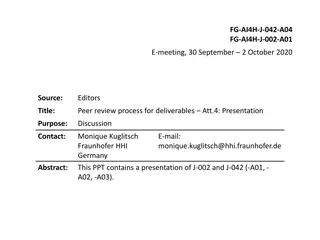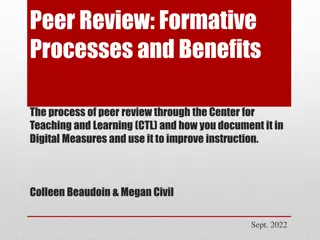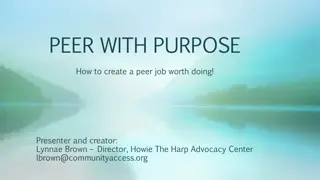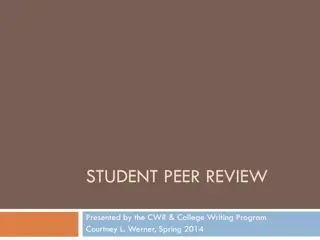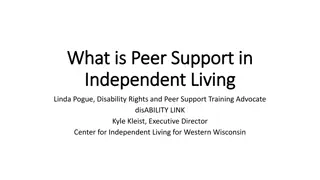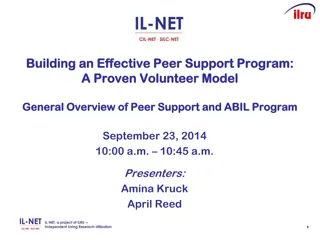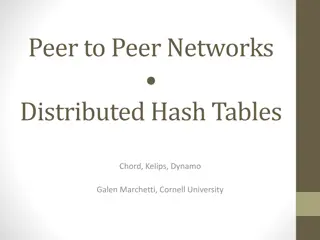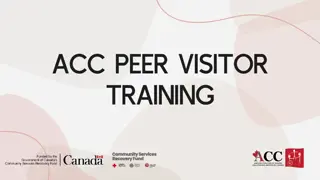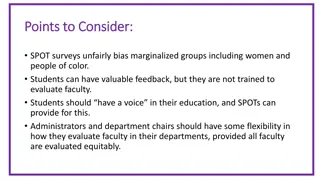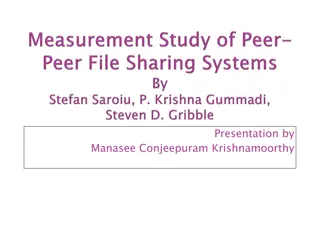Peer Support Across the Lifespan: A Comprehensive Guide
Exploring the impact of peer support at various stages of life, this comprehensive guide delves into the evolving role of advocates, the types of peer support available, and the significance of youth involvement. From adolescence to older adulthood, peer support remains flexible, transformative, and
1 views • 21 slides
Insights into Financial Services, Banking, and Stocks Innovations
Explore the latest trends in financial services including contactless payments, mobile banking, security systems, peer-to-peer lending, and the impact of Bitcoin in the industry. Discover how technology is transforming the way we manage finances and investments. From convenient mobile banking soluti
0 views • 18 slides
Enhancing Language Learning Through Peer Assessment
Explore the benefits of peer assessment as a valuable tool for language learning, comparing it with self-assessment. Discover the components and challenges of self-assessment, along with the potential of peer assessment to improve accuracy and promote self-regulation. Gain insights into what peer as
3 views • 29 slides
Peer Review Essentials
Explore the importance of peer review in research, the benefits of being a reviewer, types of peer review processes, and basic principles to follow as a peer reviewer. Learn how to make initial impressions when reviewing papers effectively.
1 views • 37 slides
Peer Support and Visitor Training for Amputees
Explore the world of peer support and visitor training for individuals who have undergone amputations. Understand the benefits of peer support, the role of peer visitors, and engage in group discussions to enhance knowledge and skills in providing meaningful support. Dive into role-playing activitie
0 views • 90 slides
Mental Health and Peer Support Services Event
Join Specialty Mental Health Services (SMHS) and Peer Support Services on Tuesday, April 19, 2022, from 3:00 p.m. to 4:00 p.m. for valuable insights and strategies. Discover the importance of DHCS programs in ensuring coverage continuity for millions of beneficiaries. Learn how to become a DHCS Cove
2 views • 23 slides
Importance of Boundaries for Peer Specialists
Boundaries are essential in defining acceptable behavior and maintaining safety and trust in relationships, including peer relationships. Peer specialists should establish and communicate their boundaries effectively while respecting those of others. Tips for setting boundaries are provided, emphasi
2 views • 14 slides
Guidelines for Lecturer Evaluations and Entitlements at CPP
This document outlines the evaluation process for lecturers at CPP, including annual and cumulative evaluations, who needs to be evaluated, the importance of cumulative evaluations, and the time periods covered by evaluations. It explains the criteria for evaluations, ensuring fair assessment and pr
1 views • 10 slides
Understanding Peer Tutoring: Definition, Types, and Objectives
Peer tutoring is a collaborative learning approach where students of similar or different ages help each other learn. It involves one student instructing another in a subject where the former is knowledgeable and the latter is not. The primary objectives of peer tutoring include enhancing students'
1 views • 12 slides
Enhancing Peer Observation for Professional Development
Explore the purposes and challenges of peer observation, learn strategies to implement effective peer feedback, bridge institutional requirements with developmental goals, and foster a culture of collaboration in teaching practices. Discover a framework for constructive dialogue, evaluate learning e
2 views • 12 slides
IEEE 802.11-20/1938r8 TXOP Sharing for MU P2P Communication
The document discusses the IEEE 802.11-20/1938r8 standard and proposes mechanisms for an Access Point (AP) to facilitate peer-to-peer communication between stations (STAs). It introduces the concept of triggered TXOP sharing to enhance latency performance and spectral efficiency in scenarios involvi
8 views • 8 slides
Insights from Surveys on Peer Review & Peer Feedback in Scholarly Communication
Results from surveys on peer review and peer feedback provide valuable insights into the demographics, general attitudes, and major challenges faced in scholarly communication. The data reveals respondent demographics, overall satisfaction with peer review systems, and prevalent problems in current
0 views • 13 slides
Understanding Suicide Beliefs and Peer-to-Peer Support Groups
Explore beliefs about suicide and the impact on open discussions. Learn about Alternatives to Suicide peer-to-peer groups and the values and framework they uphold for mutual support. Emphasizing empathy, respect, and non-coercive approaches, these groups provide a safe space for individuals to share
3 views • 20 slides
Enhancing Supportive and Accessible User Experiences Through Single Sign-Ons and Peer Feedback
Empower your users with mobile-supportive single sign-ons, inclusive environments, and seamless peer-to-peer feedback. Ensure accessibility at all times, monitor skill development, and create positive user experiences. Utilize instant feedback mechanisms, track progress, and implement seamless seque
0 views • 9 slides
Revolutionizing Insurance: Exploring Peer-to-Peer Contractual Structures
Explore the evolution of insurance contracts in the digital age, as discussed by Margarida Lima Rego in a webinar on peer-to-peer insurance. Challenges, regulatory aspects, and innovative models like Teambrella are highlighted, emphasizing trust-building and direct exchanges in the sharing economy.
0 views • 10 slides
Understanding Intentional Peer Support and its Importance in Mental Health Recovery
Intentional Peer Support, presented by David Dedrickson, emphasizes purposeful relationships where individuals support and challenge each other to explore new perspectives and behaviors. It involves peer-to-peer interactions based on shared experiences, offering a unique form of support different fr
0 views • 23 slides
Understanding Distributed Hash Tables in Peer-to-Peer Systems
Distributed Hash Tables (DHTs) are a fundamental component in organizing nodes in peer-to-peer networks. By using hash functions to assign keys to peers, DHTs enable efficient storage and retrieval of objects. Peers in a DHT are responsible for storing and managing key-value pairs, with each key bei
0 views • 31 slides
Southern Oregon Peer Workforce Project Findings and Recommendations
The Southern Oregon Peer Workforce Project conducted research to enhance peer training and supervision programs. The project aimed to foster shared learning among peer support services in Southern Oregon, leading to improved advocacy and evaluation capabilities. The findings and recommendations from
0 views • 42 slides
Enhancing Inclusivity: IFAD Independent Evaluations for Better Targeting
IFAD independent evaluations play a crucial role in ensuring that vulnerable groups are not left behind in rural development initiatives. By assessing the effectiveness of targeting methods, documenting instances where vulnerable groups are excluded, and providing recommendations for improvement, th
0 views • 8 slides
Last Mile Project Evaluation and Aftermath Guidelines
The Last Mile Project V1.5 and Week 13 Evaluation involve submission deadlines, tutorial and lecture timeslots, user acceptance testing, peer evaluations, and bug resolution processes. Peer evaluations are essential for testing multiple products with varied features, providing insights and improving
0 views • 6 slides
Peer Learning Benefits and Practical Applications in Librarianship
Exploring the benefits of peer-to-peer learning in librarianship through real-life scenarios and research projects. Peer training enhances understanding, encourages questions, and provides a supportive environment for skill development. The MLA research project exemplifies collaborative learning wit
0 views • 21 slides
Peer Review Process for Deliverables in FG-AI4H
Presentation by Monique Kuglitsch from Fraunhofer HHI discussing the peer review process for deliverables in FG-AI4H. The presentation covers the importance of peer review, the workflow, finding reviewers, components of a review, and provides a checklist for peer reviewing TDD. Additionally, a white
0 views • 4 slides
Creating a Peer Support Program for Clinicians and Staff
A peer support service is being developed to provide emotional support to clinicians impacted by adverse events in patient care. The program aims to offer immediate, confidential, and voluntary access to peer support, serving as emotional first aid rather than therapy. Peer supporters play a crucial
0 views • 11 slides
Professional Peer Supervision: Enhancing Support and Development for the Peer Workforce
Chris Grumley, a Specialist Peer Worker at Flourish Australia, presents the importance of Professional Peer Supervision in supporting and developing the Peer Workforce. The benefits include critical reflection, accountability, and nurturing expertise. The focus is on utilizing Lived Experience, well
0 views • 14 slides
Enhancing Teaching Through CTL Peer Review Process
Explore the formative processes and benefits of peer review at the Center for Teaching and Learning (CTL). The article delves into the voluntary nature of peer review at UT, outlining its three components and the step-by-step process from pre-observation to post-observation conferences. Discover how
0 views • 21 slides
Global Peer Review Activities and Future Plans Overview
This document highlights the recent peer review activities conducted by the Subcommittee on Peer Review, focusing on the accomplishments and upcoming plans for enhancing peer review processes. It includes insights from the Global Flyer Survey, training programs, and the development of guidelines, al
0 views • 3 slides
Creating a Purposeful Peer Job: Essential Tips and Strategies
Gain insights into creating a meaningful peer job through understanding the role, job responsibilities, and effective hiring practices. Explore the difference between peer role and peer job, along with valuable tips for a successful hire in peer support positions. Enhance your knowledge to develop a
0 views • 21 slides
Enhancing Peer Review Practices in College Writing Programs
Explore the significance of peer review in college writing instruction, emphasizing the practicality, foundational pedagogies from the 1970s-1990s, and strategies to improve peer review processes. Learn how to set a foundation, make peer reviews more social using writing groups and online platforms,
0 views • 5 slides
Peer Support in Independent Living: Importance, Types, Training, and COVID Impact
Peer support in independent living plays a crucial role in connecting individuals with disabilities, providing a way for them to connect, share experiences, and build a supportive community. It is considered a core service that can be offered through individual or group settings. Training programs a
0 views • 9 slides
Building an Effective Peer Support Program: Overview and Regulations
The presentation provides insights into building an effective peer support program, encompassing the definition of peer support, regulations governing peer support, and the role of volunteer peer mentors. It emphasizes the importance of peer relationships and role models in promoting independence am
0 views • 24 slides
Performance Evaluation Workshop 2022 for Civil Service & Academic Positions
This workshop outlines the Performance Evaluation Cycle for the year 2022, detailing the evaluation period, form submission deadlines, and the shift towards digital evaluations. It emphasizes the importance of constructive feedback in evaluations and provides insights into the purpose of evaluations
0 views • 34 slides
Faculty Evaluations: Periods, Deadlines & Procedures
Annual and cumulative evaluations for temporary and tenured faculty are essential in the academic setting. Annual evaluations cover the past year's teaching activities while cumulative evaluations consider a longer timeframe. Deadlines and review processes are detailed in the evaluation calendar for
0 views • 12 slides
Lecturer Evaluations and Policies at Cal Poly Pomona
Annual and cumulative evaluations are conducted for lecturers at Cal Poly Pomona to review their performance over specific periods. Policy 1336 outlines the criteria for evaluations, including timelines and requirements for different categories of lecturers. The evaluations cover teaching activities
0 views • 13 slides
Evolution of Peer-to-Peer Networks and Distributed Hash Tables
Peer-to-peer networks and distributed hash tables have evolved significantly over the years, from the early days of ARPANET to the emergence of decentralized systems like Chord, Kelips, and Dynamo. This evolution has brought about a shift towards greater decentralization, improved scalability, and e
0 views • 39 slides
Peer Support and Visitor Training Workshop
Explore the importance of peer support in the amputation process through engaging discussions and role-playing activities. Discover the short-term and long-term benefits of peer support, understand the attributes and benefits it offers, and delve into when and where peer visiting can be most impactf
0 views • 93 slides
Addressing Bias in Student Evaluations of Faculty: Considerations and Resolutions
SPOT surveys can unfairly bias marginalized groups in academia, such as women and people of color, impacting faculty evaluations. While student feedback is valuable, students may not be equipped to assess teaching effectively. Institutions should use SPOT data for reflection rather than consequentia
0 views • 4 slides
Uncovering Fabricated Data in Stem Cell Research: The Haruko Obokata Scandal
Haruko Obokata, a promising stem cell researcher in Japan, faced allegations of data fabrication, leading to a significant research scandal. Post-publication peer review platforms like PubPeer, PubMed Commons, F1000 Research, and ResearchGate Open Review play vital roles in detecting and addressing
0 views • 11 slides
Local MAC Address Assignment Protocol (LAAP) and 802.1CQ
The Local MAC Address Assignment Protocol (LAAP) in conjunction with 802.1CQ specifies protocols and procedures for locally unique assignment of MAC addresses in IEEE 802 networks. LAAP operates in two modes - Server Mode and Peer-to-Peer Mode, ensuring efficient allocation of MAC addresses while av
0 views • 15 slides
Evaluating Peer-Peer Systems in Distributed Architectures
Abundant research is being conducted in peer-peer architectures, focusing on evaluating peers to understand system effectiveness. The lack of such assessments led to a detailed study on organizing peers in decentralized systems like Napster and Gnutella. The process involved crawling systems to meas
0 views • 43 slides
Understanding Settlement Agreements in Special Education Cases
Delve into the complexities of settlement agreements in special education cases through the lens of the South Kingstown v. Joanna S. case in the First Circuit Court. The case revolves around disputes over independent educational evaluations, occupational therapy evaluations, and psychoeducational ev
0 views • 27 slides



